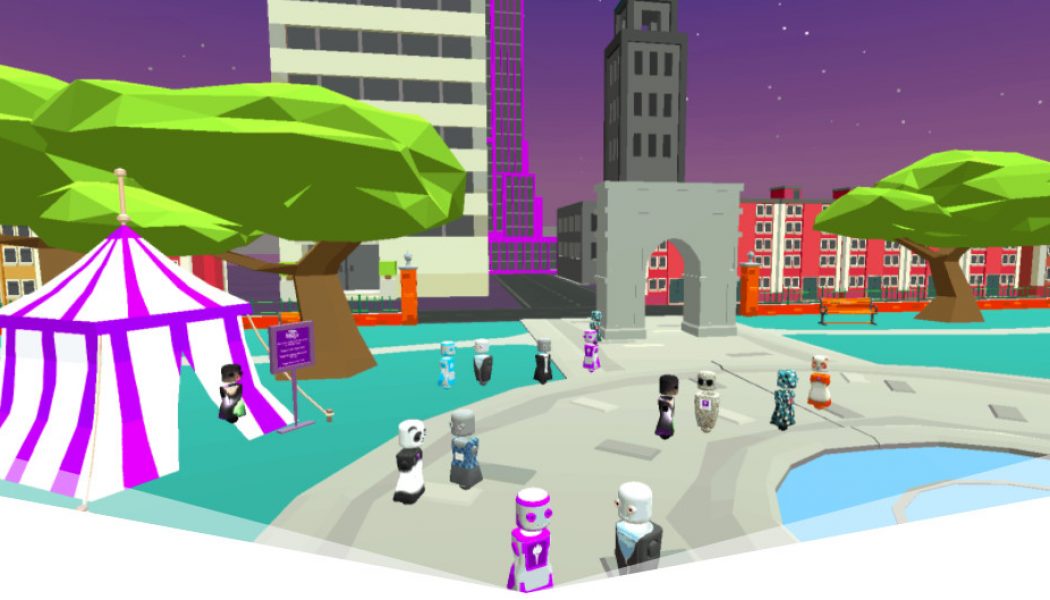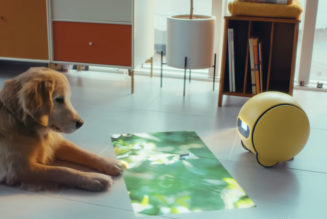
On May 19th, New York University student John DiLillo attended Grad Alley, the school’s annual block party to celebrate commencement. For two hours, he and a few friends went to places like “Pictionary Island” and peered into the (surprisingly hollow) rubbery inside of a dolphin. He got stuck underground. He ran into exactly six people, including “a mysterious panda avatar who flew several virtual yards away from us and claimed to be a moderator trying to make sure we were having fun.” Eventually, he logged off with a headache.
DiLillo, like countless students across the country, would not be spending graduation the way he envisioned. The pandemic has made that kind of mass gathering, filled with students, teachers, and parents, not just irresponsible, but potentially deadly. To soften the loss, NYU officials instead ushered thousands of students into a virtual space dubbed “VR Grad Alley,” a blocky, low-res re-creation of places associated with the school. The idea makes sense on paper. Stuck inside, people have had to get creative. House Party is how we socialize, dates take place on FaceTime, weddings happen over Zoom, and Animal Crossing is where the best talk shows are. Travis Scott held a concert in Fortnite. If kids can re-create their college campuses in Minecraft, why not throw a graduation party online?
But for some students who attended, Grad Alley wasn’t just a letdown. It was a puzzling experience to send them off into the world. Those who spoke to The Verge describe it as surreal or even downright bleak. “It had tremendous DashCon vibes,” says student Chris Kindred, referring to Tumblr’s infamous failed con. “Somebody really tried to make a slice of New York, seemingly based on no reference of New York.”
A spokesperson for NYU, Jason Hollander, tells The Verge that the school came up with the idea after speaking to senior students. Many wished they could return to campus before graduation. “While we sadly couldn’t fulfill that for them, we wanted to offer them some sense of being back in the Village before they officially became alumni,” he says. They decided to do a riff on the Grad Alley block party, this time “in VR as a nostalgic taste” of Washington Square Park where the festivities typically take place.
“The goal was to give students a chance to explore the space alongside friends, to make a few last lighthearted NYU memories, and to, hopefully, bring a smile to their faces after a long and challenging semester,” Hollander says.
To enter Grad Alley, students first created their avatar, a legless, robotic being with a bubblehead and googly-eyed stare. They could choose from a set of cartoonish skins, including everything from pandas and Game Boys to Star Trek’s Spock. There was also the option to upload photos to blank avatars, but some students had trouble with this as well. “I couldn’t find a photo that fit the mold, so it just ended up looking like my avatar was wearing an alien’s skin Silence of the Lambs-style,” DiLillo says. The VR world included rooms to join for different activities, such as chess in a virtual Washington Square Park, a trivia lounge, and a rooftop lounge.
But VR Grad Alley was, by design, not made to allow for students to meet up with just anyone. They could invite each other into rooms that held up to 25 of their friends, but only after the event went live. To do so, they needed a link or code to the room they intended to join. “We did this so that friends could find each other and spend time together on their last official day as students,” Hollander says.
Each account of the experience given to The Verge sounds a bit like a person describing a dream. Kindred says he went to the Kimmel Rooftop Lounge “because it looked the least ridiculous,” only to encounter “a video of a guy who looked almost exactly like Quentin Tarantino, playing a midi controller.” Eventually, he realized his character model wasn’t attached to the floor, allowing him to freely float away. “I did end up finding my way to the end of the universe,” he jokes about his character clipping through the game’s scenery. “I ended up going maybe a few minutes out, and I guess at that point it started to look a little profound.” Or at least, he adds, as profound as it could be after you’ve found the seams of the game.
Another student, Melissa Alvarez, says it felt like playing a weird version of Minecraft or Roblox with no reward. “I turned my mic on to talk to people, but obviously there was no one in there to talk to so that was a waste of time. That was enough to turn me off and I decided to leave. My friends refused to join.”
On Twitter, Elizabeth Ballou tweeted several dispatches and screenshots, including an in-game selfie booth with the oddly unenthusiastic declaration “CONGRATULATIONS,” no punctuation, printed in block letters on a purple background. (Ballou wrote about her own experiences with NYU and Grad Alley for Vice.) Speaking to The Verge, she described the vibe as depressing, “a vaporwave nightmare.” There was a frustrating kind of isolation to it all, says Ballou and a lack of the spontaneous interactions that make experiences like an online game feel joyful. “Even if I had been able to persuade more friends to join me, what would we have done? The controls didn’t allow us to take actions like dancing, or smiling, or congratulating each other.”
Those who did successfully group up with friends reported mic and sound issues. According to DiLillo, the mics worked best only if you were close to each other; the farther you strayed from others, the quieter it was. “This blocky facsimile of New York just made me miss actually being able to spend time in the real thing with real people instead of in cyber-purgatory with a few butt-plug robots.”
NYU made a bizarre attempt at an MMO called “Grad Alley” that recreates parts of campus for graduating students. I cannot describe how bad it is. a random assemblage of textures. auto-generated usernames. nonsensical tools. every room is named “whatever” and is completely empty. pic.twitter.com/qnrYHOZVBC
— elizabeth ballou (@lizbetballou) May 19, 2020
Another, a Tisch senior who asked to remain anonymous, said they spent roughly an hour online but that most of their time was eaten up by waiting for things to load or run. “I feel kind of indifferent, I suppose,” the student says. “Nobody asked for it, but it happened, and now it’s gone. The NYU administration has been clear that we aren’t getting a tuition refund, but trying to funnel the money into whatever this thing was certainly wasn’t a solution.”
Asked about the preparation for Grad Alley, Hollander said the school only had a few short weeks to enact their plan. In addition to servers that could potentially house all 20,000 graduating students, Hollander says NYU was “committed to ensuring this emerging technology was accessible to people of all abilities, including the visual and hearing impaired.” The final product was a joint effort between Manhattan-based design team Jump Into the Light, faculty in the NYU Future Reality Lab, the Steinhardt Games for Learning Institute, and the NYU Moses Center for Student Accessibility and the NYU Ability Project. “This was our first effort on the social VR front, and we learned a lot from the experience,” Hollander says.
(Curiously, NYU’s Game Center was not involved with the project; Hollander did not address a question about why the Game Center was not consulted. Game Center faculty member Naomi Clark says she learned of it through a student. “Of course NYU is a big institution, and often the left hand doesn’t know what the right hand is doing. But given that we’re the game design department of the university and MMOs and virtual worlds are at least somewhat related to games, we thought we would have at least heard about this.” Game Center students had already been hanging out virtually for weeks using Habboon. They successfully threw their own celebration independently prior to Grad Alley.)
Hollander says NYU sees “enormous potential” in the tech as a communal tool, and it intends to use feedback to continue improving the experience of social VR. “Because of the need to accommodate such a potentially huge audience, we opted to give students more control over their opportunity to socialize — rather than grouping them randomly together — and this did lead to some having trouble finding others.” He says that more than 3,000 unique users logged into the event over the course of its four-hour run. One student, he claims, even managed to connect with a job opportunity. “In all, while surely surreal, we hope the Class of 2020 found little distraction and had some fun during an otherwise stressful time.”
Reflecting on their inability to attend a proper celebration, some students acknowledged Grad Alley’s failures while voicing appreciation for the school’s best efforts. “The vibe was sad, and depressing, but I get it,” says Alvarez. “It’s like — what else were they supposed to do? I’ve been seeing a lot of my peers complaining at every turn, and if I were part of the administration at NYU I might have quit by now. I don’t know what else they could have done, this sucks for everyone and I guess this was a pretty inventive way to make up for not holding Grad Alley in person. Any event they might have held virtually would get hate.”
For NYU students, it’s a bittersweet end to their time at school. “It’s been a little bit difficult for me to put my disappointment about the way this semester ended into words,” says DiLillo, “because obviously I and most of my peers are coming from a place of extreme privilege.” In the scheme of things, their difficulties are nothing compared to those of essential workers or people who have lost their jobs. “But the way every day blends together right now does make it difficult for graduates to really feel like they’ve accomplished anything whatsoever,” he says. “Instead of getting a few days to celebrate before plunging into the job search, it’s all just the same thing with one day blending into the next, and oops, now we’ve graduated. It’s exhausting.”
Other students echo the sentiment. The Tisch senior calls being unable to say a proper goodbye to their classmates, teachers, or favorite spots heartbreaking; their thesis projects remain on indefinite hold. “It feels like I’ve tripped across the finish line, instead of walked triumphantly across a stage.”
Commencement was a 27-minute pre-recorded video on YouTube. “I should have been at Yankee Stadium bored out of my mind!” says Alvarez, referring to what the festivities might have been in a normal year. “I want people to understand that while I know I was fortunate enough to graduate at all, in a way that felt connected, it sucks so bad and no postponed commencement will make up for it. Senior week and all of these fun events were taken from me. My last chance to be a college senior, a ‘kid’ in a way before the ‘real world’ happens to me, was just ripped from me.
“I know I’ll survive, but I cried all day because I couldn’t celebrate with my friends. And no, a weird version of NYU Minecraft did not make me feel better.”









